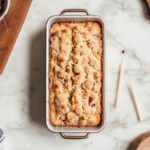Greek Yogurt Cheesecake is one of those special desserts that can turn any gathering into a celebration. It’s time for a healthier twist on this classic treat!
This Greek yoghurt cheesecake is luxuriously smooth, easy to make, and surprisingly good for you. With a thick and creamy custard texture, it’s high in protein, nutritious, and filling—no cream cheese needed!
You can pour it into any store-bought or homemade crust, or even serve it in bowls as a fancy cheesecake mousse. It’s a soft and delicious homemade cheesecake that just happens to be healthy, too.
Serve it chilled with your favourite toppings. Store any leftovers tightly covered in the refrigerator. It’s like a dessert dream come true!

Greek Yogurt Cheesecake Recipe
Ingredients
For the Graham Cracker Crust:
- 2 cups Graham cracker crumbs about 13 graham cracker sheets
- ¼ cup Granulated sugar
- ½ cup Unsalted butter melted
- Pinch of salt
For the Cheesecake Filling:
- 15 ounces 2% Plain Greek yogurt about 1⅔ cups
- 16 ounces Reduced fat cream cheese softened to room temperature
- 3 Large eggs at room temperature
- 1 cup Granulated sugar
- ¼ cup All-purpose flour
- 1½ tsp Pure vanilla extract
- Finely grated zest of 1 small lemon optional
Instructions
- Wrap foil around the bottom of a 9-inch springform pan to catch any leaks. Preheat your oven to 325°F.
Make the Graham Cracker Crust:
- In a large bowl, mix together the graham cracker crumbs, sugar, melted butter, and a pinch of salt. Once combined, press the mixture into the bottom and about an inch up the sides of your springform pan. Use the bottom of a measuring cup to press it in firmly. Pop the crust in the freezer while you make the filling.
Make the Cheesecake Filling:
- In a food processor, blend the Greek yogurt, cream cheese, eggs, sugar, flour, vanilla, and lemon zest until the mixture is smooth and creamy. Make sure to stop and scrape down the sides and bottom a few times to get everything evenly mixed.
- Pour the creamy filling into the prepared crust and smooth out the top. Place the pan in the center of your oven and bake for 45-55 minutes. You’ll know it’s done when the edges are set, but the center still has a slight jiggle. Cool the cheesecake on a wire rack until it reaches room temperature, then transfer it to the fridge to chill completely (this will take a few hours).]
- Serve the cheesecake chilled with any toppings you like. Keep any leftovers tightly covered in the refrigerator.
Notes
- This cheesecake is versatile and pairs well with a variety of toppings. Consider fresh berries, fruit compote, caramel sauce, chocolate ganache, or a dusting of powdered sugar. You can even add a dollop of whipped cream for an extra touch.
- Using Greek yogurt adds a subtle tang and helps lighten the texture of the cheesecake. If you prefer a richer cheesecake, you can use full-fat Greek yogurt.
- For the best results, ensure that your eggs and cream cheese are at room temperature before mixing. This helps create a smoother batter and a more evenly baked cheesecake.
Nutrition Facts:
| Nutrition | Value |
|---|---|
| Calories | 340 kcal |
| Carbohydrates | 36g |
| Protein | 8g |
| Fat | 15g |
| Sugar | 27g |
| Calcium | 114mg |
| Iron | 1mg |
| Fibre | 1g |
Can I Use Greek Yoghurt Instead of Cream Cheese in Cheesecake?

Yes, you can! In this recipe, some of the cream cheese is replaced with Greek yoghurt to make the cheesecake a bit healthier and add a protein boost. Greek yoghurt also gives the cheesecake a slightly tangy flavour that complements the sweetness. My favourite brand to use is Stonyfield Greek yoghurt.
Does Greek Yoghurt Bake Well?
Absolutely! Greek yoghurt is a great healthy alternative to baking recipes. It can replace mayonnaise in dishes like Deviled Eggs to create a rich filling with less added fat. It works wonderfully in this cheesecake recipe, helping to create a creamy and delicious texture.
How Long Does Greek Yoghurt Last?
Greek yogurt can be stored in the refrigerator at 40°F for one to two weeks. If you need to store it longer, you can freeze it at 0°F for one to two months.
Remember that while Greek yoghurt freezes well, some other soft cheeses, such as cottage cheese, ricotta, or Brie, can only be refrigerated for up to one week and don’t freeze well.





